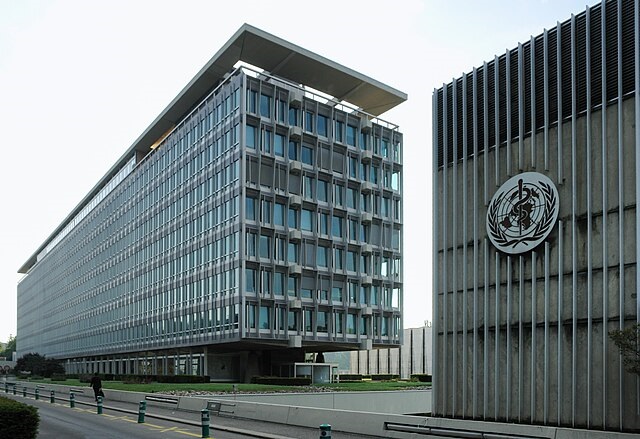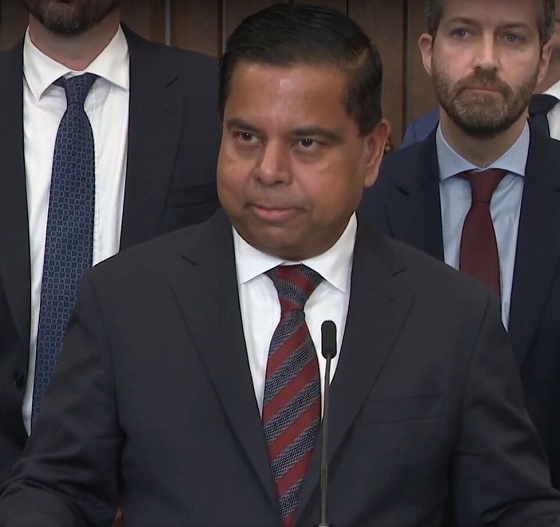Great Reset
The fundamental crisis with the WHO’s new international pandemic agreement

The WHO’s Managerial Gambit
From the Brownstone Institute
BY
The WHO is now proposing a new international pandemic agreement and amendments to the International Health Regulations. These proposals will make next time worse. Not because they override sovereignty, but because they will protect domestic authorities from responsibility. States will still have their powers. The WHO plan will shield them from the scrutiny of their own people.
On Friday, Bret Weinstein warned of impending tyranny from the World Health Organization. “We are in the middle of a coup,” the evolutionary biologist and podcaster told Tucker Carlson on X. The WHO’s new pandemic management regime will eliminate sovereignty, Weinstein said, and allow it to override national constitutions.
He’s right about tyranny and coups. But not about sovereignty or constitutions.
Technocrats learned a lot from Covid. Not how to avoid policy mistakes, but how to exercise control. Public authorities discovered that they could tell people what to do. They locked people down, closed their businesses, made them wear masks, and herded them to vaccination clinics. In some countries, people endured the most extreme restrictions on civil liberties in peacetime history.
The WHO is now proposing a new international pandemic agreement and amendments to the International Health Regulations. These proposals will make next time worse. Not because they override sovereignty, but because they will protect domestic authorities from responsibility. States will still have their powers. The WHO plan will shield them from the scrutiny of their own people.
Under the proposals, the WHO will become the directing mind and will of global health. It will have authority to declare public health emergencies. National governments will promise to do as the WHO directs. Countries will “undertake to follow WHO’s recommendations.” WHO measures “shall be initiated and completed without delay by all State Parties…[who] shall also take measures to ensure Non-State Actors [private citizens and domestic businesses] operating in their respective territories comply with such measures.” Lockdowns, quarantine, vaccines, surveillance, travel restrictions, and more will be on the table.
That sounds like a loss of sovereignty, but it is not. Sovereign states have exclusive jurisdiction in their own territory. WHO recommendations cannot be directly enforced in American courts. Sovereign nations can agree to follow the authority of international organizations. They can undertake to tie their own hands and to fashion their domestic laws accordingly.
The WHO proposals are a shell game. The scheme will provide cover to domestic public health authorities. Power will be ubiquitous but no one will be accountable. Citizens will lack control over the governance of their countries, as they already do. The danger that confronts us is still our own sprawling discretionary administrative state, soon to be boosted and camouflaged by an unaccountable international bureaucracy.
When countries make treaties, they make promises to each other. International law may regard those promises as “binding.” But they are not binding in the same sense as a domestic contract. International law is a different animal from domestic law. In Anglo-American countries, the two legal systems are distinct.
International courts cannot enforce treaty promises against unwilling parties in the same way that a domestic court can enforce contractual promises. International law is formalized international politics. Countries make promises to each other when it is in their political interests to do so. They keep those promises on the same criteria. When they don’t, political consequences sometimes follow. Formal legal consequences rarely do.
Nevertheless, the idea is to persuade the public that their governments must obey the WHO. Binding recommendations legitimize the heavy hands of domestic governments. Local officials will be able to justify restrictions by citing global duties. They will say that WHO directives leave them no choice. “The WHO has called for lockdowns, so we must order you to stay in your home. Sorry, but it’s not our call.”
During Covid, authorities tried to censor dissenting views. Despite their best efforts, skeptics managed to speak out. They offered alternative explanations in podcasts, videos, declarations, research papers, columns, and tweets. For many people, they were the source of sanity and truth. But next time things may be different. Under the new pandemic regime, countries will commit to censoring “false, misleading, misinformation or disinformation.”
As Weinstein put it, “Something is quietly moving just out of sight, in order that we will not have access to these tools the next time we face a serious emergency. … What [the WHO] wants are the measures that would have allowed them to silence the podcasters, to mandate various things internationally in a way that would prevent the emergence of a control group that would allow us to see harms clearly.”
The WHO documents will not override constitutions in Anglo-American countries. In the United States, the First Amendment will still apply. But the meaning of constitutions is not static. International norms can influence how courts read and apply constitutional provisions. Courts can take account of developing international standards and customary international law. The WHO proposals would not replace or define the meaning of constitutional rights. But they would not be irrelevant either.
The WHO is not undermining democracy. Countries have done that over time by themselves. National governments must approve the new plan, and any can opt out as they wish. Without their agreement, the WHO has no power to impose its dictates. Not all countries may be keen on all the details. The WHO proposals call for massive financial and technical transfers to developing countries. But climate change pacts do too. In the end rich countries embraced them anyway. They were keen to virtue-signal and justify their own climate boondoggles. Most can be expected to sign on to the WHO gambit too.
Countries who do so retain the sovereignty to change their minds. But leaving international regimes can be hellishly difficult. When the UK belonged to the European Union, it agreed to be subject to EU rules on all manner of things. It remained a sovereign country and could decide to get out from under the EU’s thumb. But Brexit threatened to tear the country apart. Having the legal authority to withdraw does not mean that a country is politically able to do so. Or that its elites are willing, even if that’s what its people want.
Numerous critics have made the same allegations as Weinstein, that the WHO’s regime will eliminate sovereignty and override constitutions. Brownstone writers have done so, for example, here and here. These allegations are easy to dismiss. Tedros Adhanom Ghebreyesus, the Director-General of the WHO, has repeatedly said that no country will cede sovereignty to the WHO. Reuters, the Associated Press, and other mainstream news outlets have done “fact checks” to debunk the claim. Saying that the WHO will steal sovereignty allows critics to be discredited as conspiracy theorists. It distracts from the game that is afoot.
The WHO proposals will protect power from accountability. National governments will be in on the plan. The people are the problem they seek to manage. The new regime will not override sovereignty but that is small comfort. Sovereignty provides no protection from your own authoritarian state.
Business
Justice Centre launches new petition: Keep cash legal and accessible. Stop Bill C-2

Public Safety Minister Gary Anandasangaree speaks to Bill C-2 (Screenshot from CBC video)
The Justice Centre for Constitutional Freedoms has launched a petition calling upon the Prime Minister of Canada to strike the criminalization of cash payments of $10,000 or more from Bill C-2 and to introduce legislation protecting the right of Canadians to use cash of any amount for legal transactions.
Public Safety Minister Gary Anandasangaree introduced Bill C-2, or the Strong Borders Act, in the House of Commons on June 3, 2025. According to a Government of Canada statement, Bill C-2 will equip law enforcement with tools to secure borders and to combat crime, the drug trade, and money laundering.
Buried deep within the Bill, however, are provisions that would make it a criminal offence for businesses, professionals, and charities to accept cash payments of $10,000 or more in a single transaction or in a series of related transactions.

Bill C-2 at page 59
Justice Centre President John Carpay warns that the criminalization of cash transactions threatens the privacy, freedom of expression, and autonomy of all Canadians. When cash transactions are criminalized, governments, banks, and law enforcement can track and interfere with legitimate purchases and donations.
“We must not criminalize everyday Canadians for using physical currency. Once $10,000 is criminalized, it will be all too easy for future governments to lower the threshold to $5,000, then $1,000, and eventually nothing.”
Bill C-2 is just one point in a concerning anti-cash trend in Canada.
Quebec’s controversial Bill 54, passed into law in March 2024, allows police to assume that any person carrying $2,000 or more in cash is connected to criminal activity. Officers can seize the cash, and citizens must prove their innocence to get the cash back.
“Restricting the use of cash is a dangerous step towards tyranny,” continued Mr. Carpay. “Cash protects citizens from surveillance by government and banks, credit card companies, and other corporations. In a free society, violating the right of law-abiding citizens to use cash is not the answer to money laundering or the drug trade.”
Signers of the petition call upon the Prime Minister of Canada to strike the criminalization of cash payments from Bill C-2.
Signers of the petition also call upon the Prime Minister of Canada to introduce legislation that protects Canadians’ right to use cash of any amount for legal transactions.
Business
Telegram founder Pavel Durov exposes crackdown on digital privacy in Tucker Carlson interview

From LifeSiteNews
By Robert Jones
Durov, who was detained in France in 2024, believes governments are seeking to dismantle personal freedoms.
Tucker Carlson has interviewed Telegram founder Pavel Durov, who remains under judicial restrictions in France nearly a year after a surprise arrest left him in solitary confinement for four days — without contact with his family, legal clarity, or access to his phone.
Durov, a Russian-born tech executive now based in Dubai, had arrived in Paris for a short tourist visit. Upon landing, he was arrested and accused of complicity in crimes committed by Telegram users — despite no evidence of personal wrongdoing and no prior contact from French authorities on the matter.
In the interview, Durov said Telegram has always complied with valid legal requests for IP addresses and other data, but that France never submitted any such requests — unlike other EU states.
Telegram has surpassed a billion users and over $500 million in profit without selling user data, and has notably refused to create government “backdoors” to its encryption. That refusal, Durov believes, may have triggered the incident.
READ: Arrest of Telegram founder Pavel Durov signals an increasing threat to digital freedom
French prosecutors issued public statements, an unusual move, at the time of his arrest, fueling speculation that the move was meant to send a message.
At present, Durov remains under “judicial supervision,” which limits his movement and business operations.
Carlson noted the irony of Durov’s situating by calling to mind that he was not arrested by Russian President Vladimir Putin but rather a Western democracy.
Former President of Russia Dmitry Medvedev has said that Durov should have stayed in Russia, and that he was mistaken in thinking that he would not have to cooperate with foreign security services.
Durov told Carlson that mandates for encryption “backdoors” endanger all users, not just suspects. Once created, such tools inevitably become accessible to hackers, foreign agents, and hostile regimes.
“In the US,” he commented, “you have a process that allows the government to actually force any engineer in any tech company to implement a backdoor and not tell anyone about it.”
READ: Does anyone believe Emmanuel Macron’s claim that Pavel Durov’s arrest was not political?
Durov also pointed to a recent French bill — which was ultimately defeated in the National Assembly — that would have required platforms to break encryptions on demand. A similar EU proposal is now under discussion, he noted.
Despite the persecution, Durov remains committed to Telegram’s model. “We monetize in ways that are consistent with our values,” he told Carlson. “We monetized without violating privacy.”
There is no clear timeline for a resolution of Durov’s case, which has raised serious questions about digital privacy, online freedom, and the limits of compliance for tech companies in the 21st century.
-

 Health19 hours ago
Health19 hours agoLast day and last chance to win this dream home! Support the 2025 Red Deer Hospital Lottery before midnight!
-

 Business2 days ago
Business2 days agoCarney’s European pivot could quietly reshape Canada’s sovereignty
-

 Aristotle Foundation23 hours ago
Aristotle Foundation23 hours agoThe Canadian Medical Association’s inexplicable stance on pediatric gender medicine
-

 conflict1 day ago
conflict1 day ago“Evacuate”: Netanyahu Warns Tehran as Israel Expands Strikes on Iran’s Military Command
-

 Alberta2 days ago
Alberta2 days agoAlberta’s grand bargain with Canada includes a new pipeline to Prince Rupert
-

 Energy1 day ago
Energy1 day agoCould the G7 Summit in Alberta be a historic moment for Canadian energy?
-

 Crime1 day ago
Crime1 day agoMinnesota shooter arrested after 48-hour manhunt
-

 Bruce Dowbiggin1 day ago
Bruce Dowbiggin1 day agoWOKE NBA Stars Seems Natural For CDN Advertisers. Why Won’t They Bite?





